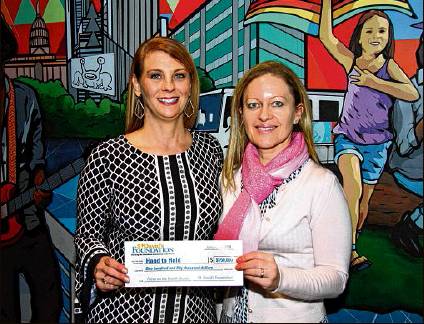GIVING CITY AUSTIN
Nonprofit agencies get funds to tackle maternal mortality rate
By Monica Williams Giving City Austin
It’s rare for nonprofit agencies to be able to address an issue before it escalates, and funders are less likely to offer grants unless data shows absolute proof of the need. But across Central Texas and the country, various indicators are pointing to an alarming increase in the rate of deaths among new mothers, a demographic that’s hard to track and yet vital to the health and success of families.
To get ahead of the issue, Austin’s St. David’s Foundation has awarded $2 million in grants to 10 local nonprofits, with much of it going toward projects and services never offered before.
“While we hope, through our grants, we will contribute to solutions, we really think about this in terms of improving maternal, postpartum health overall,” said Elizabeth Krause, senior program officer as the St. David’s Foundation. “We’re looking for long-term solutions and to find some answers.”
Recent trends in health data point to an increase in deaths among new mothers across the state. Those indicators include the fact that Texas continues to have the highest uninsured rate in the country, almost twice the national average. Krause adds that chronic diseases that can affect maternal mortality, such as diabetes and high blood pressure, are on the rise, and that the new epidemic of opioid addiction also contributes to maternal deaths.
And while a 2017 report showed a 200 percent increase in maternal deaths in Texas over the past four years, that data was somewhat disputed, mostly because there are also too many barriers to collecting that data accurately.
“Maternal deaths are very rare,” Krause said. “But I call it our canary in the coal mine, a warning sign that there are things in our health care system that are dangerous to women.”
Among the grantees is Mama Sana Vibrant Woman, which received a grant of $169,405 to extend its programs and services for prenatal care to postpartum care for mothers. The nonprofit creates a network of support for clients, focusing on minority and low-income women, who tend to fare worse in every indicator of infant and maternal health. “We have been informally doing work beyond that in postpartum care including home visits and one-on-one support,” said co-founder Paula Rojas. “This grant allows us to formalize that.”Mama Sana will use the funds to train and pay minority women to be birth companions, or doulas, whose job it is to provide support during and after the birth. “We’re trying to build a workforce that’s culturally in tune with our clients,” said Rojas. “So far, our birth companions have been volunteers. Now this grant will allow us to pay them, maybe not market rate, but at a rate that’s a dignified income for women.”
Other nonprofits will also create or extend programs and services. The nonprofit Hand to Hold will use its $150,000 grant to gear its services toward African-American women, a population it struggles to reach, and the research and training nonprofit Cardea will use its $300,000 grant to create a process for opioid screening, intervention and referral at WIC clinics that serve low-income women and children.
“Sometimes people want to start working on prevention when it’s too late, and that’s the beauty of this,” said Vanessa Sarria of Cardea. “St. David’s wants to get ahead of the curve.”
GIVING CITY AUSTIN This article is published through a partnership with Giving City Austin, which reports on the area’s nonprofit community. Read more Giving City stories at
